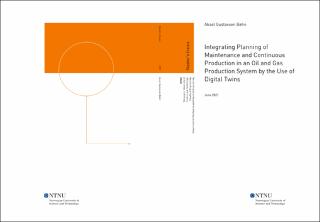Integrating Planning of Maintenance and Continuous Production in an Oil and Gas Production System by the Use of Digital Twins
Master thesis
Permanent lenke
https://hdl.handle.net/11250/2799898Utgivelsesdato
2021Metadata
Vis full innførselSamlinger
Sammendrag
Denne avhandlingen undersøker hvordan matematiske modeller kan fungere som grunnlag for å integrere produksjons- og vedlikeholdsplanlegging i digitale tvillinger og cyber-fysiske systemer. Avhandlingen tar for seg produksjons- og vedlikeholdsplanlegging i olje- og gassindustrien, der vedlikehold anses å være en vesentlig driftskostnad. Integrering av produksjons- og vedlikeholdsplanlegging er utfordrende fordi de to fagene generelt er i konflikt med hverandre. Beslutninger angående produksjonsplanen påvirker tilstanden til maskinene i systemet, mens beslutninger om når man skal utføre vedlikehold gir begrensninger for produksjonsplanen. Tidligere studier har ikke tatt høyde for mulighetene digitale tvillinger og cyber-fysiske systemer bringer for å integrere produksjon og vedlikehold. For å løse dette har matematiske modeller blitt utledet i denne oppgaven for å definere prinsipper for hvordan modellene skal samhandle og utnytte mulighetene digitale tvillinger og cyber-fysiske systemer bringer. Modellene er blitt knyttet til eksisterende forskning angående konsepter, rammeverk, teknologier og verktøy for digitale tvillinger og cyber-fysiske systemer for å diskutere hvordan dette kan bidra til å realisere de matematiske modellene i en digital tvilling og et cyber-fysisk system, og hvordan dette kan bidra til beslutningstaking på tvers av fagområdene. Resultatene avslører at modellene må automatisk samle inn data i sanntid, utveksle data mellom dem og andre elementer i en digital tvilling og et cyber-fysisk system, samt håndtere avhengigheten mellom produksjonsplanen og maskinens tilstand. Et forslag til videre arbeid er å inkludere en stokastisk prosess i modelleringen av tilstanden for å fange usikkerheten ved nedbrytningsprosessen. This thesis investigates how mathematical models can serve as a basis for integrating production and maintenance planning in digital twins and cyber-physical systems. The thesis considers production and maintenance planning in the offshore oil and gas industry, where maintenance is considered to be a significant operating cost. Integrating production and maintenance planning is challenging because the two disciplines generally conflict with each other. Decisions regarding the production plan influence the condition of the machines in the system, while decisions for when to perform maintenance impose restrictions for the production plan. Previous studies have not dealt with the capabilities of digital twins and cyber-physical systems for integrating production and maintenance. To address this, mathematical models have been derived in this thesis to define principles for how these models should interact in order to utilise the capabilities of digital twins and cyber-physical systems. The models were linked to existing research concerning concepts, frameworks, technologies, and tools for digital twins and cyber-physical systems to discuss how this can contribute to realising the mathematical models in a digital twin and cyber-physical system and how it can contribute to decision-making across the disciplines. The results reveal that the models must automatically gather data in real-time, exchange data between them and with other elements of the digital twin and cyber-physical system, and handle the dependency between the production plan and the condition of the machines. A recommendation for further work is suggested to include a stochastic process in the modelling of the condition to capture the uncertainty of the degradation process.
